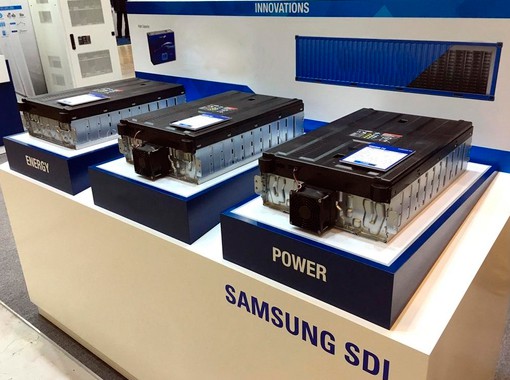Samsung SDI shares traded on South Korea’s Kospi bourse took a battering early this week after Morgan Stanley downgraded its target price from 570,000 won to 550,000 won.
On Monday, Samsung SDI shares shed 1.7 trillion won in market cap, as the stock price dropped 3.91 percent, while the shares traded mostly flat on Tuesday near the previous day’s close at 615,000 won.
Morgan Stanley made the downgrade as battery manufacturers are failing to generate enough profits since their primary focus is currently on expansion and market share.
However, local experts question whether the Morgan Stanley downgrade is fair, pointing out that Samsung SDI's strategy is putting profitability ahead of expansion plans.
Han Byung-hwa, an analyst at Eugene Investment & Securities, noted that unlike rivals LG Energy Solution and SK Innovation, Samsung SDI doesn’t have a US battery plant and a joint venture with automakers.
LG Energy Solution and SK Innovation, have made ambitious tie-ups and expansion plans, even targeting the US market, which is the world’s largest.
Han added that Samsung SDI lacks the motivation to build a new battery plant in the US as it does not have automaker partners there who can guarantee massive battery supply deals.
The top US automakers with key participation in President Joe Biden’s push for EVs, GM and Ford, have already formed joined ventures with its LGES and SKI.
Samsung SDI recently signed a deal to supply batteries to Rivian, a local EV startup backed by investments from Amazon and Ford, and consolidated partnership with loyal clients such as BMW.
Samsung SDI and BMW will collaborate to develop a next-generation battery.
But Samsung SDI has to foray into the US by 2022 at the latest, should it decide to do so, since, under the United States-Mexico-Canada Agreement, automakers will have to certify by 2023 that 75 percent of their EV components are made in one of the three countries to avoid tariffs in the region.
Also, Samsung Group can’t go all-in on the batteries as their priority is on other businesses such smartphones, chips, and auto parts.
Furthermore, rather than splurge money on expanding its lithium-ion battery manufacturing capabilities, Samsung SDI is likely to divert its investments into the research and development of next-generation solid-state batteries.



 FDA Targets Hims & Hers Over $49 Weight-Loss Pill, Raising Legal and Safety Concerns
FDA Targets Hims & Hers Over $49 Weight-Loss Pill, Raising Legal and Safety Concerns  Tencent Shares Slide After WeChat Restricts YuanBao AI Promotional Links
Tencent Shares Slide After WeChat Restricts YuanBao AI Promotional Links  Dollar Near Two-Week High as Stock Rout, AI Concerns and Global Events Drive Market Volatility
Dollar Near Two-Week High as Stock Rout, AI Concerns and Global Events Drive Market Volatility  Amazon Stock Rebounds After Earnings as $200B Capex Plan Sparks AI Spending Debate
Amazon Stock Rebounds After Earnings as $200B Capex Plan Sparks AI Spending Debate  SoftBank Shares Slide After Arm Earnings Miss Fuels Tech Stock Sell-Off
SoftBank Shares Slide After Arm Earnings Miss Fuels Tech Stock Sell-Off  South Korea Assures U.S. on Trade Deal Commitments Amid Tariff Concerns
South Korea Assures U.S. on Trade Deal Commitments Amid Tariff Concerns  Nvidia Confirms Major OpenAI Investment Amid AI Funding Race
Nvidia Confirms Major OpenAI Investment Amid AI Funding Race  Palantir Stock Jumps After Strong Q4 Earnings Beat and Upbeat 2026 Revenue Forecast
Palantir Stock Jumps After Strong Q4 Earnings Beat and Upbeat 2026 Revenue Forecast  Fed Governor Lisa Cook Warns Inflation Risks Remain as Rates Stay Steady
Fed Governor Lisa Cook Warns Inflation Risks Remain as Rates Stay Steady  Trump Endorses Japan’s Sanae Takaichi Ahead of Crucial Election Amid Market and China Tensions
Trump Endorses Japan’s Sanae Takaichi Ahead of Crucial Election Amid Market and China Tensions  Missouri Judge Dismisses Lawsuit Challenging Starbucks’ Diversity and Inclusion Policies
Missouri Judge Dismisses Lawsuit Challenging Starbucks’ Diversity and Inclusion Policies  SpaceX Seeks FCC Approval for Massive Solar-Powered Satellite Network to Support AI Data Centers
SpaceX Seeks FCC Approval for Massive Solar-Powered Satellite Network to Support AI Data Centers  AMD Shares Slide Despite Earnings Beat as Cautious Revenue Outlook Weighs on Stock
AMD Shares Slide Despite Earnings Beat as Cautious Revenue Outlook Weighs on Stock  Elon Musk’s Empire: SpaceX, Tesla, and xAI Merger Talks Spark Investor Debate
Elon Musk’s Empire: SpaceX, Tesla, and xAI Merger Talks Spark Investor Debate  Trump Backs Nexstar–Tegna Merger Amid Shifting U.S. Media Landscape
Trump Backs Nexstar–Tegna Merger Amid Shifting U.S. Media Landscape  SpaceX Prioritizes Moon Mission Before Mars as Starship Development Accelerates
SpaceX Prioritizes Moon Mission Before Mars as Starship Development Accelerates  Nvidia Nears $20 Billion OpenAI Investment as AI Funding Race Intensifies
Nvidia Nears $20 Billion OpenAI Investment as AI Funding Race Intensifies 































